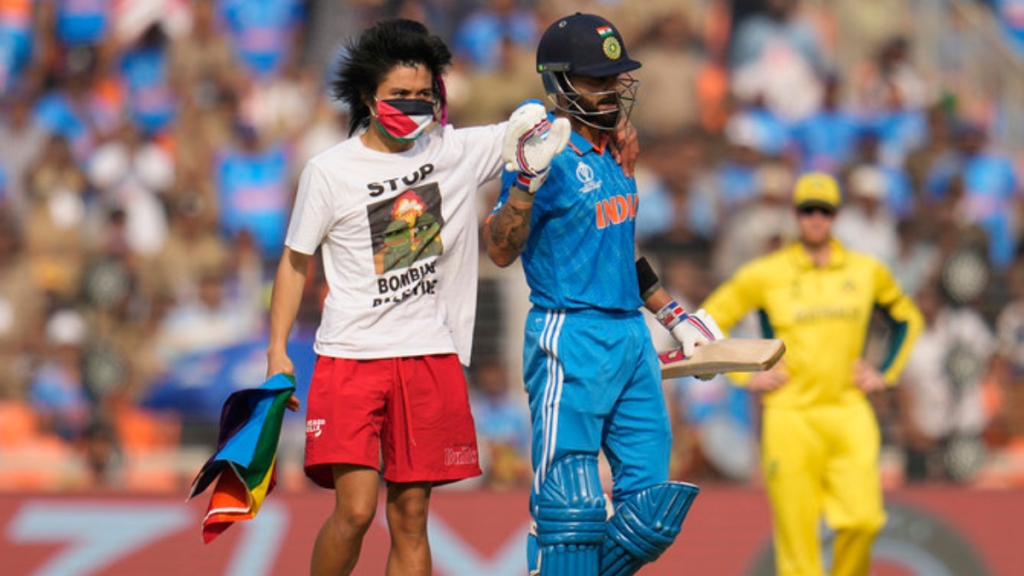The World Cup final incident involving a pro-Palestine protester and cricket icon Virat Kohli has sparked a debate on security measures and the role of sports in global politics.The demonstrator got close to Kohli, who was at the crease, when he slipped past security. The protester fought back against the security officers’ attempts to apprehend him, and a violent confrontation ensued. The episode brought to light the precarious relationship between sports and politics, as players are frequently inadvertently drawn into the limelight of global politics. Athletes should be able to utilize their platforms to bring attention to significant causes, according to proponents of athletes’ rights, whereas opponents of this idea say that sports should be neutral. Concerns regarding the efficacy of safeguards meant to protect players and preserve the game have been sparked by the security breach that occurred during the World Cup final. Discussions regarding political activism in sports as a whole have also been ignited by this episode. This episode shows that even in sports, where teamwork and rivalry are supposed to take center stage, outside forces may creep in and make us all think about how politics and athletics mix.
The Incident:
As the World Cup final reached a crucial stage, with both teams locked in a fierce battle, the unexpected occurred. A protester carrying a pro-Palestine banner managed to breach security and make his way onto the field. Eyewitnesses reported that the protester appeared determined, heading directly towards Virat Kohli, who was at the crease.
Security personnel swiftly reacted, attempting to intercept the protester before he could reach the Indian cricket captain. The situation escalated as the protester resisted, leading to a physical altercation. In a dramatic turn of events, the protester was wrestled to the ground, raising concerns about the adequacy of security measures in place for such high-profile sporting events.
The Intersection of Sports and Politics:
The incident highlighted the delicate balance between sports and politics, with athletes often finding themselves unintentionally thrust into the spotlight of geopolitical issues. In recent years, sports events have become platforms for political statements, with athletes and fans expressing their views on various global issues.
While the protester’s cause – advocating for Palestine – may be valid, the question arises: Is a sporting event the appropriate venue for such activism? Critics argue that sports should remain neutral grounds, providing an escape from the complexities of the world. However, supporters of athlete activism contend that athletes, as influential figures, have the right to use their platforms to raise awareness about important issues.
Security Concerns:
The breach of security during the World Cup final has raised serious questions about the effectiveness of measures in place to safeguard players and maintain the integrity of the game. The protester’s ability to enter the field and approach a player of Virat Kohli’s stature suggests a significant lapse in security protocols. Sports events, especially those of international significance, demand heightened security measures to ensure the safety of players, officials, and spectators. The incident involving Virat Kohli serves as a wake-up call for organizers to reassess and enhance their security strategies, preventing future disruptions that could jeopardize the well-being of those involved.
The Fallout:
In the aftermath of the incident, there has been a mixed response from the cricketing community, fans, and the general public. Some have applauded the quick response of security personnel in neutralizing the threat and protecting the players. Others, however, express concern about the use of force, questioning whether a more diplomatic approach could have been employed.
The incident has also sparked discussions about the broader issue of political activism within the realm of sports. While some argue that athletes should stick to their respective fields and avoid engaging in political discourse during games, others believe that athletes have a responsibility to leverage their platforms for positive change.
Conclusion:
The World Cup final incident involving a pro-Palestine protester and Virat Kohli has brought to the forefront the complex relationship between sports and politics. As the cricketing world reflects on this shocking episode, there is an opportunity for organizers to reevaluate and reinforce security protocols at major sporting events. Additionally, the incident prompts a broader conversation about the role of athletes in advocating for social and political causes, raising questions about the boundaries between sports and global issues. Ultimately, this incident serves as a reminder that even in the world of sports, where the focus should be on competition and camaraderie, external factors can intrude, forcing society to grapple with the intersection of sports and the geopolitical landscape.







